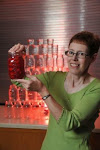Kids Learn Attitudes About Food in Child Care Settings
About three-quarters of U.S. children ages two to six spend large portions of their days in non-parental child care--including more than 240,000 children in Wisconsin. Research shows that many of these children learn food and nutrition attitudes and preferences while in child care.
A recent study of child care programs in Wisconsin and Minnesota conducted by UW-Madison researcher Tara LaRowe found that most child care teachers in the study wanted to learn more effective ways to encourage healthy eating. They also wanted to know about low-cost ways to serve healthy foods, and ways to engage parents in creating a unified approach to nutrition and mealtimes.
“Nutrition is the basis of children’s health, but mealtimes with young children can be difficult–even power struggles—for caregivers who are not well-trained,” says Dave Riley, an expert on child development and early education for Cooperative Extension and a professor at UW-Madison.
Riley and Susan Nitzke, Cooperative Extension nutrition specialist and nutritional sciences Professor Emerita at the UW-Madison, along with co-authors Ann Ramminger and Georgine Jacobs, have written a new book called Rethinking Nutrition: Connecting Science and Practice in Early Childhood Settings published by Redleaf Press in St. Paul.
Half the sentences in each chapter are about the science of nutrition in early childhood, and the other half are about the practices of good child care programs that affect children’s nutrition and development. It is common to find books on one topic or the other, but not on both the science and the practice linked together, he says.
The authors also wanted to address growing concerns about childhood obesity by promoting a healthier diet for young children. Nearly a quarter of U.S. children between the ages two and five are overweight or obese. Becoming overweight as a young child strongly predicts a lifetime of obesity, including increased risk of diabetes, heart disease and other weight-related diseases.
Topics addressed by Nitzke and Riley include:
--What foods are most needed at each stage of childhood, from infancy through preschool.
--How children learn to prefer or dislike particular foods, and how to help them adopt new foods.
--How to avoid added sugars.
--Special needs diets, including food allergies.
--How children learn to share, control their behavior, and even develop some of their pre-literacy skills at the meal table.
--How to develop a nutrition policy for a child care program, and why it is a good idea to do so. (Currently, around a third of child care programs in Wisconsin and Minnesota have a nutrition policy.)
Chapters include many practice tips, suggested children’s books, and a letter to send home to parents on the topic of their child’s nutrition.
“The bottom line is that familiarity is key to children’s adoption of foods,” Nitzke says. “Repeated exposure to a new food--without pressure, coaxing or bribery--is the best way to encourage kids to eat it.”
“Great child care programs do this in lots of ways,” Riley adds. “The kids help grow food in a garden, help cook the food, and read children’s books about new foods. All of these are ways to become familiar with zucchini or spinach, and then learning to love them.”





Healthy food is very important for our child to give them a healthy living. In that case we need kids nutrition tips to give them a healthy diet, so that our child live a energetic living.
ReplyDeleteNicely talking to ways to eat healthy food and make health. Blog really provides healthy tips to gain health. Thanks.
ReplyDeleteVery good information.
ReplyDeleteCosmetic Surgery India
I simply love what you have said here but I think that you could do a bit more to let readers connect with your content better. You have got lots of content in your sites with very few images.
ReplyDeletePure coffee extract
Very Informative article...Keep posting more article...
ReplyDeleteI guess these tips should be learn to the mothers now a days and they should need to educate their kids Dhow cruise Dubai
ReplyDeleteΗi woulԁ you minԁ statіng
ReplyDeleteωhісh blοg platform you're using? I'm looking tо stаrt mу own blοg in thе near future
but I'm having a hard time deciding between BlogEngine/Wordpress/B2evolution and Drupal. The reason I ask is because your design seems different then most blogs and I'm looκіng for something uniquе.
P.S Soгry for beіng off-topic but I had to аsk!
my sіtе ... pa system for Cb radio
Good post ....knowledgeable thoughts ...
ReplyDeleteReally great post ...informative blog..
ReplyDeleteNice post..really informative
ReplyDeletesuperb article.so much to learn from this.Thanks
ReplyDelete